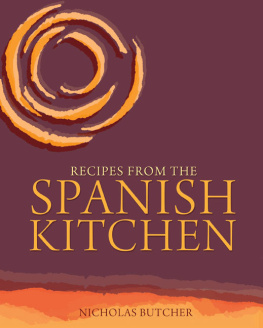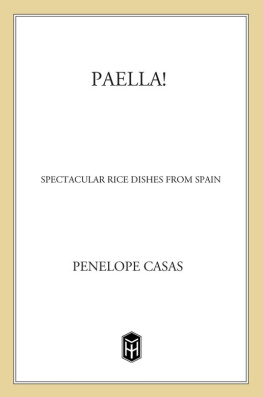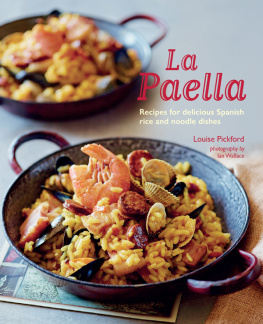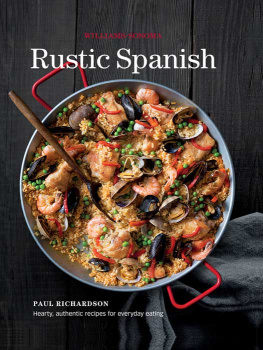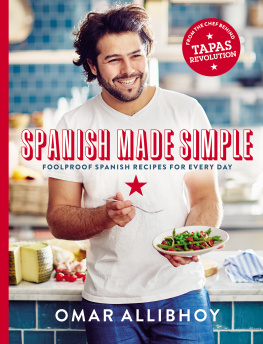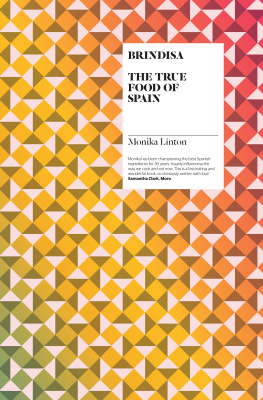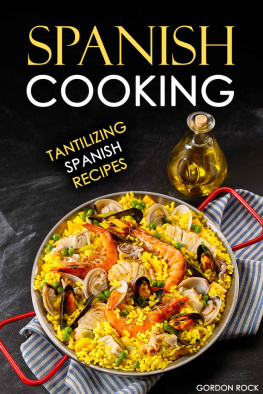

IN MEMORY OF MY PARENTS, GEOFFREY AND AUDREY BUTCHER
This new edition published 2012
by Grub Street,4 Rainham Close, London SW11 6SS
post@grubstreet.co.uk
www.grubstreet.co.uk
First published in 1990 as The Spanish Kitchen by Macmillan
Copyright Nicholas Butcher 1990, 2012
Illustrations Debbie Lian Mason 1990
Jacket design: Sarah Driver
The moral right of the author has been asserted.
All rights reserved. No part of this publication may be reproduced, stored in a retrieval system or transmitted in any form or by any means, electronic, mechanical, photocopying, recording or otherwise without the prior permission of the publisher.
The publisher gratefully acknowledges the permission granted to reproduce the copyright material in this book. Every effort has been made to trace copyright holders and to obtain their permission for the use of copyright material. The publisher apologises for any errors or omissions and would be grateful to be notified of any corrections that should be incorporated in future reprints or editions of this book.
A CIP catalogue for this book is available from the British Library
ISBN 978-1- 908117-24-3
Printed and bound by MPG Ltd, Bodmin, Cornwall
on FSC (Forest Stewardship Council) paper
Contents
Foreword
TO THE NEW EDITION
When I first started exploring Spain and acquiring the information which would eventually form the basis of this book, getting around the country was often a frustratingly slow process. Roads in some places were improving, but only some, and the country and its possibilities seemed to stretch out in front of you for ever. Now, of course, you can speed comfortably from one corner of the peninsula to the other. The effect of these efficient motorways, and high- speed trains and planes has been to make Spain, in effect, shrink.
I have to admit that the pleasure has perhaps shrunk a little too. While being aware of the romantic trap of nostalgia, I am convinced that much is lost when hurtling along the countrys modern roads with their gentle curves and easy overtaking. When driving around Spain now, a quarter of a century later, my gratitude at reduced journey times is tempered by a sadness that somehow I am no longer able to appreciate my surroundings in quite the same way as before. In addition, my route from A to ? no longer takes me through quiet small towns and villages, too numerous to remember. They have been sidetracked by the rush to save time.

Yet if you take the trouble you can still find solitude in this great country and find yourself on roads where you have to go so slowly that you can hear the birds singing over the noise of the engine. Here you do have time to pause and listen, and to gape in gratitude and wonder at the sights Spain has to offer.
So much has changed, but who would expect less as the twentieth century became the twenty-first? Spains food has changed; the face of Spain too, and it seems foolish to resist, even if perhaps one should not rush to total surrender. It is reassuring that its people still have an inexhaustable willingness to enjoy themselves at a frenetic pace, yet can offset this by an admirable ability to switch off, to never take anything too seriously for too long, to say to the uptight foreigner, Tranquilo, hombre, take it easy, nothing is worth getting in such a state about. I think this geniality communicates itself to Spains food and wine, which in their turn provide a civilised framework for cordial enjoyment and relaxation.
It is not a perfect country. One can only wince at nave attempts to romanticise Mediterranean attitudes to alcohol consumption when one now sees children barely into their teens incapacitated by drink on a regular basis. Natural regional pride can morph into a prickly, inward-looking local nationalism when encouraged to do so by self-serving politicians. Spanish television can astonish at its fatuousness and its ability to make you feel grubby just for watching it, and by no means all Spanish families sit down together in front of that television with a healthy balanced meal based on the so-called Mediterranean diet.
On the up-side, interest thrives in both traditional and avant-garde food. This means it is no longer all but impossible to try foods and wines from beyond your region, and, in good part thanks to the internet, there is now a wonderful freedom to explore the countrys cooking, to seek out and share knowledge. People no longer think you are eccentric to make your own bread, or to drink a red wine from somewhere other than La Rioja or Ribera del Duero.
How to condense it all into one volume? One can only be guided by ones preferences and prejudices, and I hope the reader will forgive mine (I have an obvious bias to the food of Andaluca where I live) and any favourites I have omitted. The book is much the same as when first published, but with mistakes corrected (I hope) some things added, others removed.
Finally, a word of very belated thanks to all those who helped bring this book to fruition. To all at Macmillan, who first published the book, especially Adam Sisman, Hazel Orme, Katrina Whone and Katie Owen, for their confidence in me, patience and hard work on my behalf. I am also hugely grateful to Anne Dolamore for having enough faith in the book to want to republish it.
And as always a big thank-you to Jos Alaminos, Pepe, whos been the best companion on my travels around his wonderful country that anyone could wish for.

Introduction
Trying to define Spanish food poses a problem. It is that Spanish food as a coherent concept simply does not exist. True, certain dishes have been adopted on a national scale and appear on menus throughout the country; but with regard to the rest of the food the Spanish eat, you may as well compare the cooking of Catalua with that of Andaluca as that of Normandy with that of Provence, or that of Piemonte with that of Calabria.
Spanish food, in other words, is better thought of in regional terms. It is far more helpful and accurate to talk of Basque food or Galician food or Murcian food, although these headings are still vague. This regional individuality is reflected in, or is a reflection of, the individuality of Spains different peoples, its Gallegos, its Basques, its Catalans, its Andaluces, and so on. Each region insists, with varying degrees of conviction and historical justification, on its autonomy. Nevertheless, despite the apparent slide this would suggest towards a federal state, I believe there is a strong thread uniting all Spaniards, a seam in the various strata of the Iberian character, that is mirrored in their food. There is something tantalisingly indefinable and yet unmistakable about all Spains regional food. One can detect influences from elsewhere, similarities too, but never is one in any doubt when eating genuine Spanish cuisine this could not be France or Italy or anywhere else. Spain stamps its personality, and what a personality it is, ineradicably.

Next page
